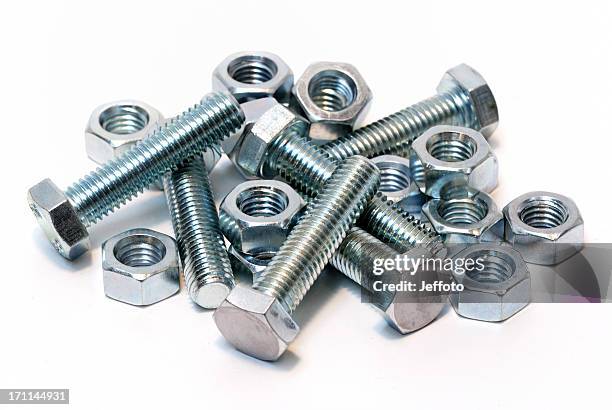Understanding the Various Types of Bolts and Nuts

When begin a construction or DIY project, the importance of choose the right fasteners cannot be overstated. These small yet essential fasteners serve as a foundation of numerous uses, providing support, integrity, and safety. Given a myriad of types available—all tailored to specific functions—grasping the fundamentals of nuts and bolts is crucial for anyone looking to address fixes, build items, or undertake major overhauls.
This complete guide, we shall explore the different types of nuts and bolts, examining their applications and applications. Starting with the most common bolts to specific fasteners, we’ll discuss all you should understand to make informed decisions and choose the right tools for your tasks. Whether you're curious about the differences between machine-type bolts and structural bolts or trying to figure out when to use a flange nut, this article is your definitive guide for navigating the world of nuts and bolts.
Types of Fasteners and Bolts
When it comes to comprehending nuts and bolts, it's essential to identify the different types available and their particular applications. Bolts are typically categorized based on their configuration and functionality. Typical types include hexagonal bolts, which possess a hexagonal head and are suitable for general fastening tasks; carriage fasteners, characterized by a rounded head and a square neck for added grip; and lag fasteners, designed for heavy-duty applications and made with a wide, flat head that allows for greater torque. Each type serves specific purposes and is often chosen based on the requirements of the job at hand.
Nuts, the complements to fasteners, also come in multiple shapes and sizes. Typical hex nuts are the most widely used, allowing for tight fastening when matched with bolts. Locking nuts provide extra safety against loosening, making them suitable for high-vibration applications. Flanged nuts, which have a wider base, spread pressure more evenly and are used where a larger surface area is beneficial. Comprehending these choices helps in choosing the right nut for multiple fastening situations, ensuring both security and efficacy.
Besides standard types, specific nuts and bolts cater to unique needs in specific industries. For instance, titanium fasteners are favored in aerospace applications for their lightweight yet durable nature, while nylon lock nuts prevent loosening due to vibration. Grasping these differences not only aids in making wise choices but also enhances the overall strength of constructions or repairs. Selecting the right combination of nuts and bolts is vital in achieving the desired strength and durability for any job.
Selecting the Correct Fastener
Picking the best fastener is vital for the success and longevity of any project. The decision between bolts and nuts often hinges on the substances being joined and the required robustness. For wood applications, lag screws are frequently used due to their capability to anchor stably, while in metalworking, machine screws with accompanying fasteners are the optimum option. Understanding the particular needs of your project, such as load-bearing and environmental conditions, will guide you in choosing the correct choice.
In addition, the type of threads plays a significant part in fastener choice. Rough threads are generally better for more delicate materials, which allows for quicker assembly, while tight threads provide greater grip in more robust materials. If you are unsure which type to use, it is beneficial to familiarize yourself with the details of threading, as well as the standards for metric system and imperial fasteners. https://powers-polat-2.technetbloggers.de/an-art-of-securing-a-beginners-guide-to-nuts-and-screws educated decision can prevent potential problems down the road, ensuring better operation and security.
Lastly, taking into account the surface treatment and material of the fasteners is essential. https://ravn-dreier-2.mdwrite.net/ten-creative-applications-for-fasteners-you-never-realize offer superb corrosion resistance, making them suitable for outdoor projects, while zinc-coated fasteners may serve well in arid environments. Always evaluate the particular conditions your fasteners will face, including possible exposure to moisture or harsh substances, to select substances that will endure the test of time. This focus to detail in selecting the right fastener will ultimately enhance the longevity and reliability of your project.
Materials and Coatings and Coatings
When choose nuts and nuts, the substances used hold a significant function in determining their functionality & suitability for specific applications. Common materials consist of iron, copper alloy, & aluminum, with each delivering distinct benefits. Iron is favored for its hardiness and longevity, making it best for intensive projects. Copper alloy, on the other hand, demonstrates superb corrosion resistance & is often utilized in plumbing & electrical applications. Titanium is renowned for its light properties and remarkable strength relative to weight, making it a preferred choice for aviation and high-tech technical applications.
Treatments considerably enhance the durability and performance of fastening devices. Zinc plating and galvanization are popular methods for protecting steel bolts from rust, with galvanization providing a more robust protective layer. However, the choice of coating is based on the environment in which the fasteners are deployed. For example, stainless steel fasteners inherently resist corrosion without extra coating, making them suitable for outdoor and marine applications where exposure to moisture is a factor.
Grasping the materials and coatings on the market helps ensure that you select the appropriate fasteners for your certain project requirements. Regardless of whether you need fasteners that can withstand harsh environments or those that ensure reliable strength, understanding of materials will allow you to make wise decisions that enhance the longevity and performance of your construction.

